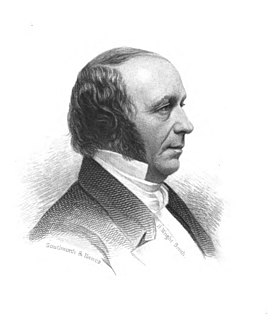A Quote by Nehemiah Adams
A certain joyful, though humble, confidence becomes us when we pray in the Mediator's name. It is due to Him; when we pray in His name it should be without wavering. Remember His merits, and how prevalent they must be. " Let us therefore come boldly to the throne of grace."
Related Quotes
We have assurance that we shall be heard in what we pray, because we pray to that God that heareth prayer, and is the rewarder of all that come unto Him; and in His name, to whom God denieth nothing; and, therefore, howsoever we are not always answered at the present, or in the same kind that we desire, yet, sooner or later, we are sure to receive even above that we are able to ask or think, if we continue to sue unto Him according to His will.
God is pursuing with omnipotent passion a worldwide purpose of gathering joyful worshipers for Himself from every tribe and tongue and people and nation. He has an inexhaustible enthusiasm for the supremacy of His name among the nations. Therefore, let us bring our affections into line with His, and, for the sake of His name, let us renounce the quest for worldly comforts and join His global purpose.
If we want to read and to pray the prayers of the Bible and especially the Psalms, therefore, we must not ask first what they have to do with us, but what they have to do with Jesus Christ...It does not depend, therefore, on whether the Psalms express adequately that which we feel at a given moment in our heart. If we are to pray aright, perhaps it is quite necessary that we pray contrary to our own heart. Not what we want to pray is important, but what God wants us to pray.
One of the most effective ways to pray is to ask God to give you a promise from his Word concerning whatever it is you're praying for. Then hold him to his Word as you pray it back to him. It's what has been called "reversed thunder." God keeps his Word, and basing our prayer on his Word gives our prayers strength and confidence because we know we're asking for something God wants to give us.
When you blow it, God still celebrates His Son in you. The litmus test of whether or not you understand the gospel is what you do when you fail. Do you run from Him and go clean yourself up a little bit before you come back into the throne room? Or do you approach the throne of grace with confidence? If you don't approach the throne of grace with confidence, you don't understand the gospel.
One of the cardinal sins in our country is profanity -- the taking of the name of the Lord in vain. Reverence for the name of Deity is enjoined in holy writ. Jesus made this clear when teaching His disciples to pray. He said, addressing the Father, "Hallowed be thy name: (see Matthew 6:9). Blaspheming the name of God separates man from his Creator."
Regardless of what anyone may personally think or believe about him, Jesus of Nazareth has been the dominant figure in the history of western culture for almost twenty centuries... It is from his birth that most of the human race dates its calendars, it is by his name that millions curse and in his name that millions pray.
The opposition is indispensable. A good statesman, like any other sensible human being, always learns more from his opponents than from his fervent supporters. For his supporters will push him to disaster unless his opponents show him where the dangers are. So if he is wise he will often pray to be delivered from his friends, because they will ruin him. But though it hurts, he ought also to pray never to be left without opponents; for they keep him on the path of reason and good sense.
"Oh, ancient god, whatever your name," whispered Ahmed. "Help this lost son of a good father, this evil boy who meant no harm but slept in school, ran errands slowly, did not pray from his heart, ignored his mother, and did not hold his family in great esteem. For all this I know I must suffer. But here in the midst of silence, at the desert's heart, where even the wind knows not my name? Must I die so young? Am I to be forgotten without having been?"
It will comfort us when we must wait in distress for the Savior's promised relief that He knows, from experience, how to heal and help us. The Book of Mormon gives us the certain assurance of His power to comfort. And faith in that power will give us patience as we pray and work and wait for help. He could have known how to succor us simply by revelation, but He chose to learn by His own personal experience.
Say of him what you please, but I know my child's failings. I do not love him because he is good, but because he is my little child. How should you know how dear he can be when you try to weigh his merits against his faults? When I must punish him he becomes all the more a part of my being. When I cause his tears to come my heart weeps with him. I alone have a right to blame and punish, for he only may chastise who loves.



































